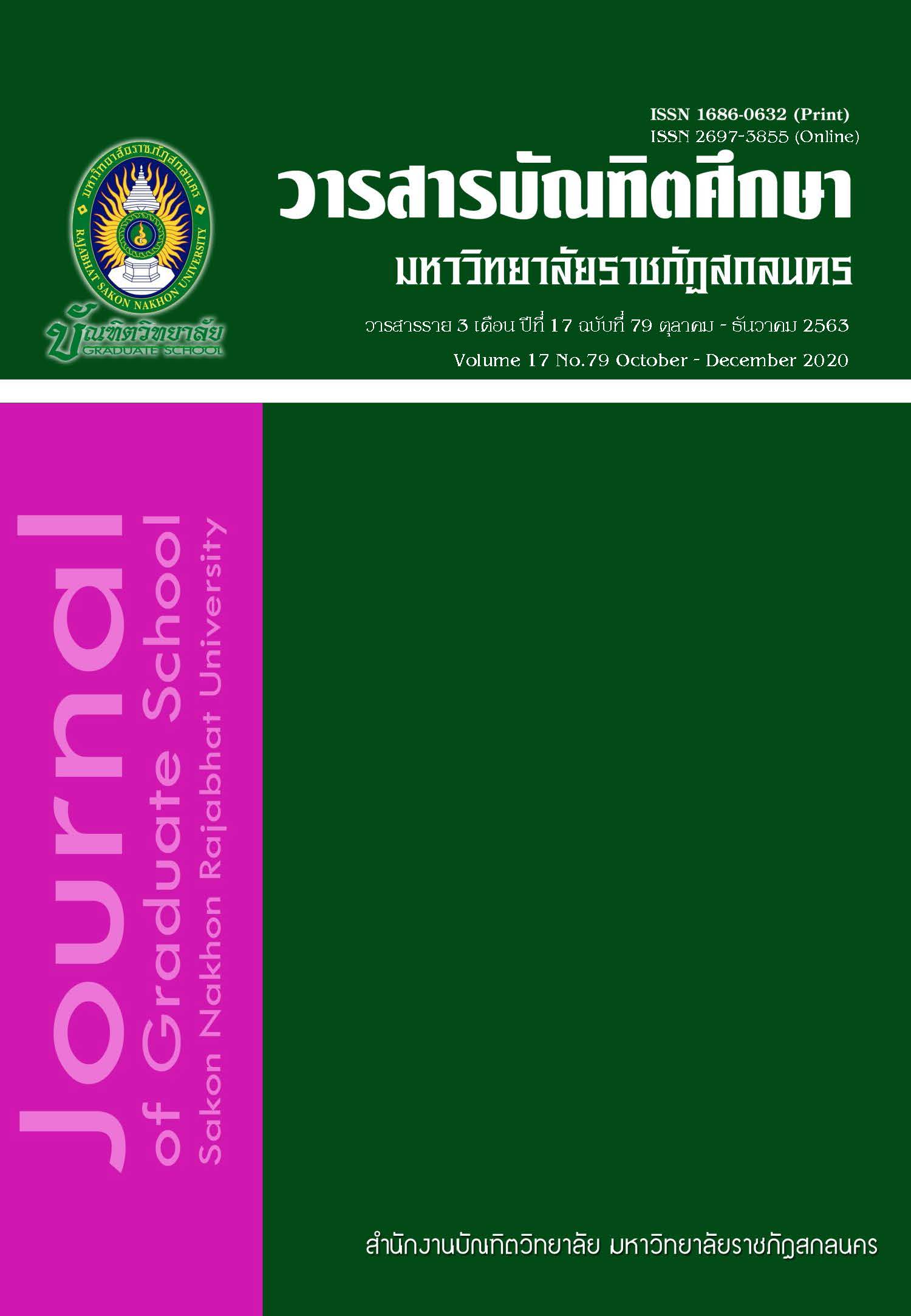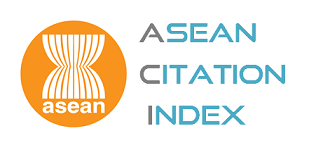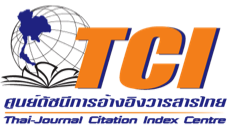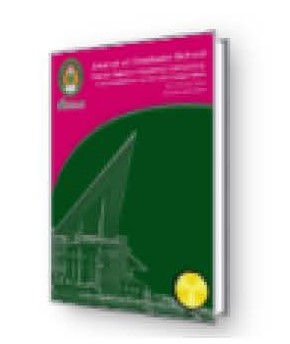ภาวะผู้นำเชิงนวัตกรรมของผู้บริหารสถานศึกษา
Keywords:
Innovative Leadership School DirectorsAbstract
Universal factors influencing education are resulting in initiatives and innovation in administrative management of Thailand’s education sector becoming increasingly necessary, consequently school directors should respond by implementing administration techniques and leadership to lead the organization toward success. In order to achieve the highest efficiency in administration and management, school directors are required to embrace and learn new concepts and approaches, such as the exchange of best practices, visionary thinking, the implementation of new work plans and strategies in steering the educational institution forward to initiate innovations, the last of which is undeniably required characteristics of administrators. In order to succeed as a school administrator in the stream of changes, self-development of a leader who achieves the principles of self-management, people management and task management is a must, and requires the arts of modern management in efficiently executing the work in all aspects. Thinking skills development is of utmost importance to encourage personnel to develop individual works toward success, and this calls for a school administrator with modern management techniques, especially innovative leadership to steer the organization toward the direction which could respond effectively to the current situations. Relating to this, there were five main components in innovative leadership: 1) innovative vision; 2) innovative teamwork and participation; 3) thinking skill for innovation; 4) innovative roles and responsibilities, and 5) innovative personality. The innovative leadership of school administrators could be indicators of success and quality of administrative management, personnel, and educational institution, which would influence the administrative management to yield the highest benefit for educational institutions.
References
ขวัญชนก โตนาค และคณะ. (2557). การวิเคราะห์องค์ประกอบภาวะผู้นำเชิงนวัตกรรมสำหรับผู้บริหารสถานศึกษาขั้นพื้นฐาน. วิทยานิพนธ์ กศ.ม. กรุงเทพฯ: มหาวิทยาลัยศิลปากร.
จารุวรรณ นาตัน. (2556). นวัตกรรมการบริหารโรงเรียนประถมศึกษาขนาดเล็ก. วารสารวิชาการ Veridian E-J0urnal, 6(3), 729-746.
จุรีวรรณ จันพลา. (2559). การเสริมสร้างภาวะผู้นำเชิงนวัตกรรมของผู้ประกอบการ ในธุรกิจแปรรูปอาหาร. วารสารเทคโนโลยีภาคใต้, 9(1), 53-60.
ธีระ รุญเจริญ. (2556). ความเป็นมืออาชีพในการจัดและบริหารการศึกษายุคปฏิรูปการศึกษา เพื่อปฏิรูปรอบ 2 และประเมินภายนอกกรอบ 3. กรุงเทพฯ: ข้าวฟ่าง.
. (2557). ความเป็นมืออาชีพในการจัดและบริหารการศึกษาในยุคปฏิรูปการศึกษา เพื่อปฏิรูปรอบ 2 และประเมินภายนอก รอบ 3. (พิมพ์ครั้งที่ 8). กรุงเทพฯ: ข้าวฟ่าง.
พระครูใบฎีกาอภิชาติ ธมฺมสุทฺโธ (2559). ภาวะผู้นำเชิงนวัตกรรมการบริหารกิจการคณะสงฆ์ในทศวรรษหน้า. วารสารสันติศึกษาปริทรรศน์ มจร, 4(2), 313-325.
พิสิฐธวัฒน์ กลิ่นไธสงค์. (2559). การพัฒนาตัวบ่งชี้ภาวะผู้นำเชิงนวัตกรรมของผู้บริหารโรงเรียนมัธยมศึกษา สังกัดสำนักงานเขตพื้นที่การศึกษามัธยมศึกษา. วารสารบริหารการศึกษา มหาวิทยาลัยขอนแก่น, 12(1), 177-186.
ศักดิ์ไทย สุรกิจบวร. (2549). การแสวงหาและแนวทางการพัฒนาภาวะผู้นำของผู้บริหารมืออาชีพ : กรณีผู้บริหารการศึกษาและผู้บริหารสถานศึกษา. กรุงเทพฯ: สุวีริยาสาส์น.
สำนักงานคณะกรรมการพัฒนาระบบราชการ. (2552). คู่มือการจัดระดับการกำกับดูแลองค์การ ภาครัฐตามหลักธรรมาภิบาลของการบริหารกิจการบ้านเมืองที่ดี (Good Governance Rating). กรุงเทพฯ: พรีเมียร์ โปร.
สุกัญญา แช่มช้อย. (2555). แนวคิดเชิงนวัตกรรมสำหรับการบริหารสถานศึกษาในศตวรรษที่ 21. วารสารศึกษาศาสตร์ มหาวิทยาลัยนเรศวร, 14(2), 117-128.
อรวรางค์ จันทร์เกษม. (2558). ความสัมพันธ์ระหว่างปัจจัยส่วนบุคคล ภาวะผู้นำเชิงนวัตกรรมของผู้บริหารตามความคิดเห็นของพนักงานและพฤติกรรมมุ่งผลสัมฤทธิ์ในการทำงานของพนักงานในอุตสาหกรรมการผลิต. วารสารวิชาการศิลปะศาสตร์ประยุกต์, 8(1), 138-144.
อรอนงค์ โรจน์วัฒนบูลย์. (2553). การพัฒนาตัวแบบผู้นำเชิงนวัตกรรม. วิทยานิพนธ์ รป.ด. กรุงเทพฯ: สถาบันบัณฑิตพัฒนบริหารศาสตร์.
Ahmed, P.K. (1998). Culture and Climate for Innovation. European Journal of Innovation Management, 1(1), 30-43.
Dave. (2007). Characteristics of Innovative Leaders. Available from http://innovativeleadership. Blogspot.com/2007/02/innovative-leadership-progress-at-warp.html. June 25th, 2013.
Jong, J. P. and Den Hartog, D. N. (2007). How leaders influence employees’ innovative behaviour. European Journal of Innovation Management, 10(1), 41-64.
Weiss, S. D. and Legand, P. C. (2011). Innovative Intelligence. Ontario: John Wiley & Sons Canada, Ltd.
Downloads
Published
How to Cite
Issue
Section
License
บทความทุกบทความที่ตีพิมพ์ในวารสารบัณฑิตศึกษา มหาวิทยาลัยราชภัฏสกลนคร ถือว่าเป็นลิขสิทธิ์ของบัณฑิตวิทยาลัย มหาวิทยาลัยราชภัฏสกลนคร










